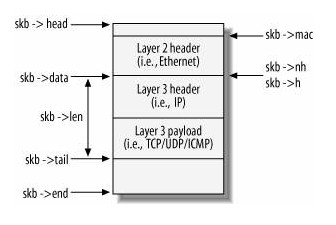本文主要内容:在接收数据包时,IP协议的处理流程。
内核版本:2.6.37
Author:zhangskd @ csdn blog
IP报头
IP报头:
struct iphdr {
#if defined(__LITTLE_ENDIAN_BITFIELD)
__u8 ihl:4,
version:4;
#elif defined(__BIG_ENDIAN_BITFIELD)
__u8 version:4, /* 协议版本,IPv4为4 */
ihl:4; /* 首部长度,不包括选项为5,表示20字节 */
#else
#error "Please fix <asm/byteorder.h>"
#endif
__u8 tos; /* TOS服务类型,6位DSCP,2为ECN */
__be16 tot_len; /* IP包总长度,最大为65535 */
__be16 id; /* 标识符,同一个IP包的不同分片具有相同的标识符 */
__be16 frag_off; /* 3个标志位,13位偏移 */
__u8 ttl; /* 存活时间,一般为64跳 */
__u8 protocol; /* L4协议值 */
__sum16 check; /* 报头校验和,不包含载荷 */
__be32 saddr; /* 源IP */
__be32 daddr; /* 目的IP */
};
ip_rcv
调用ip_rcv()时skb中的一些变量:
ip_rcv()是IP层的入口,主要做了:
丢弃L2目的地址不是本机的数据包(这说明网卡处于混杂模式,嗅探器会处理这些包)。
检查skb的引用计数,如果大于1,说明其它地方也在使用此skb,则克隆一个skb返回;否则直接返回原来的skb。
数据包合法性检查:
data room必须大于IP报头长度。
IP报头长度至少是20,类型为IPv4。
data room至少能容纳IP报头(包括IP选项)。
检查IP报头校验和是否正确。
数据包没被截断(skb->len >= 报总长),报总长不小于20。
如果L2有进行填充(以太网帧最小长度为64),则把IP包裁剪成原大小,去除填充。此时如果接收的NIC
已计算出校验和,则让其失效,让L4自己重新计算。
最后,调用netfilter的NF_INET_PRE_ROUTING的钩子函数,如果此数据包被钩子函数放行,则调用
ip_rcv_finish()继续处理。
/* Main IP Receive routinue. */
int ip_rcv(struct sk_buff *skb, struct net_device *dev, struct packet_type *pt,
struct net_device *orig_dev)
{
struct iphdr *iph;
u32 len;
/* When the interface is in promisc mode, drop all the crap that it receives,
* do not try to analyse it.
* 当数据帧的L2目的地址和接收接口的地址不同时,skb->pkt_type就被设成PACKET_OTHERHOST。
* 网卡本身会丢弃这些包,除非设成混杂模式。嗅探器自会处理这种包,IP层无需理会。
*/
if (skb->pkt_type == PACKET_OTHERHOST)
goto drop;
IP_UPD_PO_STATS_BH(dev_net(dev), IPSTATS_MIB_IN, skb->len);
/* 如果此skb的引用计数大于1,说明在其它地方也被使用,则克隆一个skb返回。
* 否则直接返回原来的skb。
*/
if ((skb = skb_share_check(skb, GFP_ATOMIC)) == NULL) {
IP_INC_STATS_BH(dev_net(dev), IPSTATS_MIB_INDISCARDS);
goto out;
}
/* 确保data room >= IP报头 */
if (! pskb_may_pull(skb, sizeof(struct iphdr)))
goto inhdr_error;
iph = ip_hdr(skb);
/*
* RFC1122: 3.2.1.2 MUST silently discard any IP frame that fails the checksum.
* Is the datagram acceptable?
* 1. Length at least the size of an ip header
* 2. Version of 4
* 3. Checksums correctly. [Speed optimisation for later, skip loopback checksums]
* 4. Doesn't have a bogus length
*/
/* IP报头长度至少是20,类型为IPv4 */
if (iph->ihl < 5 || iph->version != 4)
goto inhdr_error;
/* data room至少能容纳IP报头(包括IP选项) */
if (! pskb_may_pull(skb, iph->ihl * 4))
goto inhdr_error;
iph = ip_hdr(skb);
/* 检查IP报头校验和是否正确 */
if (unlikely(ip_fast_csum((u8 *)iph, iph->ihl)))
goto inhdr_error;
len = ntohs(iph->tot_len); /* IP报文总长度 */
/* L2为了满足最小帧的长度可能会进行填充,所以skb->len >= len。
* Ethernet数据帧的最小帧长度为64字节。
*/
if (skb->len < len) { /* 数据包被截断了 */
IP_INC_STATS_BH(dev_net(dev), IPSTATS_MIB_INTRUNCATEDPKTS);
} else if (len < (iph->ihl * 4))
goto inhdr_error;
/* Our transport medium may have padded the buffer out. Now we know it is
* IP we can trim to the true length of the frame.
* Note this now means skb->len holds ntohs(iph->tot_len).
*/
/* 如果L2有进行填充,则把IP包裁剪成原大小。
* 如果接收的NIC已计算出校验和,则让其失效,让L4自己重新计算。
*/
if (pskb_trim_rcsum(skb, len)) {
IP_INC_STATS_BH(dev_net(dev), IPSTATS_MIB_INDISCARDS);
goto drop;
}
/* Remove any debris in the socket control block */
memset(IPCB(skb), 0, sizeof(struct inet_skb_parm));
/* Must drop socket now because of tproxy. */
skb_orphan(skb);
/* 调用netfilter的NF_INET_PRE_ROUTING钩子 */
return NF_HOOK(NFPROTO_IPV4, NF_INET_PRE_ROUTING, skb, dev, NULL,
ip_rcv_finish);
inhdr_error:
IP_INC_STATS_BH(dev_net(dev), IPSTATS_MIB_INHDRERRORS);
drop:
kfree_skb(skb);
out:
return NET_RX_DROP;
}如果skb的引用计数大于1,说明在其它地方也被使用,则克隆一个skb返回,否则直接返回原来的skb。
/**
* skb_shard_check - check if buffer is shard and if so clone it
* @skb: buffer to check
* @pri: priority for memory allocation
*
* If the buffer is shared the buffer is cloned and the old copy drops a
* reference. A new clone with a single reference is returned.
* If the buffer is not shared the original buffer is returned. When being called
* from interrupt status or with spinlocks held pri must be GFP_ATOMIC.
* NULL is returned on a memory allocation failure.
*/
static inline struct sk_buff *skb_shared_check(struct sk_buff *skb, gfp_t pri)
{
/* 不能睡眠,否则调用might_sleep()打印栈的回溯信息 */
might_sleep_if(pri & __GFP_WAIT);
if (skb_shared(skb)) { /* skb->users是否为1 */
struct sk_buff *nskb = skb_clone(skb, pri);
kfree_skb(skb);
skb = nskb;
}
return skb;
}/**
* skb_orphan - orphan a buffer
* @skb: buffer to orphan
* If a buffer currently has an owner then we call the owner's destructor
* function and make the @skb unowned. The buffer continues to exist
* but is no longer charged to its former owner.
*/
static inline void skb_orphan(struct sk_buff *skb)
{
if (skb->destructor)
skb->destructor(skb);
skb->destructor = NULL;
skb->sk = NULL;
}
ip_rcv_finish
ip_rcv_finish()主要做了:
查找路由,决定要把数据包发送到哪,赋值skb_dst()->input(),发往本地为ip_local_deliver,转发为ip_forward()。
更新Traffic Control (Qos)层的统计数据。
处理IP选项,检查选项是否正确,然后将选项存储在IPCB(skb)->opt中。
最后执行skb_dst()->input(),要么发往四层,要么进行转发,取决于IP的目的地址。
static int ip_rcv_finish(struct sk_buff *skb)
{
const struct iphdr *iph = ip_hdr(skb);
struct rtable *rt;
/*
* Initialise the virtual path cache for the packet.
* It describes how the packet travels inside linux networking.
*/
if (skb_dst(skb) == NULL) {
/* 查找路由,决定要把包送往哪里 */
int err = ip_route_input_noref(skb, iph->daddr, iph->saddr, iph->tos, skb->dev);
if (unlikely(err)) {
if (err == -EHOSTUNREACH) /* no route to host,主机不可达 */
IP_INC_STATS_BH(dev_net(skb->dev), IPSTATS_MIB_INADDRERRORS);
else if (err == -ENETUNREACH) /* Network is unreachable,网络不可达 */
IP_INC_STATS_BH(dev_net(skb->dev), IPSTATS_MIB_INNOROUTES);
else if (err == -EXDEV) /* Cross-device link */
NET_INC_STATS_BH(dev_net(skb->dev), LINUX_MIB_IPRPFILTER);
goto drop; /* 目的地不可达,丢弃 */
}
}
/* 更新Traffic Control (Qos)层的统计数据 */
#ifdef CONFIG_NET_CLS_ROUTE
if (unlikely(skb_dst(skb)->tclassid)) {
struct ip_rt_acct *st = this_cpu_ptr(ip_rt_acct);
u32 idx = skb_dst(skb)->tclassid;
st[idx & 0xFF].o_packets++;
st[idx & 0xFF].o_bytes += skb->len;
st[(idx >> 16) & 0xFF].i_packets++;
st[(idx >> 16) & 0xFF].i_bytes += skb->len;
}
#endif
/* 处理IP选项,调用ip_options_compile()来检查选项是否正确,然后将选项存储
* 在IPCB(skb)->opt中。
*/
if (iph->ihl > 5 && ip_rcv_options(skb))
goto drop;
rt = skb_rtable(skb);
if (rt->rt_type == RTN_MULTICAST) {
IP_UPD_PO_STATS_BH(dev_net(rt->dst.dev), IPSTATS_MIB_INMCAST, skb->len);
} else if (rt->rt_type == RTN_BROADCAST)
IP_UPD_PO_STATS_BH(dev_net(rt->dst.dev), IPSTATS_MIB_INBCAST, skb->len);
/* skb_dst(skb)->input()在ip_route_input_noref()中被赋值,要么是ip_local_deliver(),
* 要么是ip_forward(),取决于数据包的目的地址。
*/
return dst_input(skb);
drop:
kfree_skb(skb);
return NET_RX_DROP;
}
/* Input packet from network to transport. */
static inline int dst_input(struct sk_buff *skb)
{
return skb_dst(skb)->input(skb);
}






















 604
604











 被折叠的 条评论
为什么被折叠?
被折叠的 条评论
为什么被折叠?








